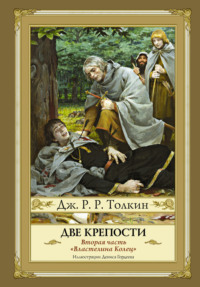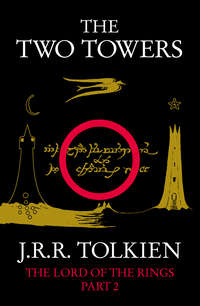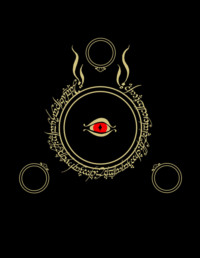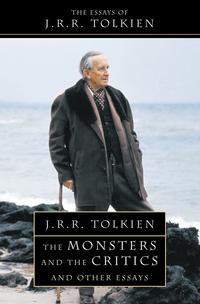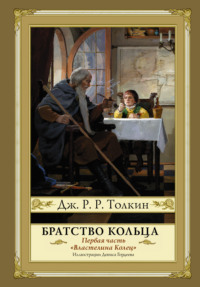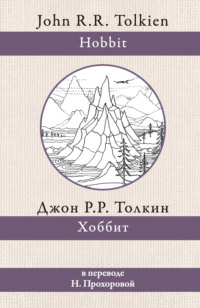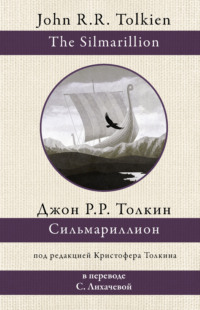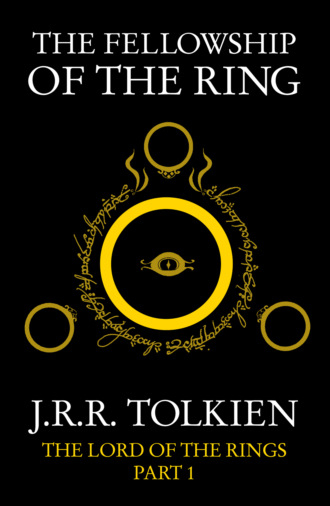
Полная версия
The Fellowship of the Ring
But the ring was not on the island; he had lost it, it was gone. His screech sent a shiver down Bilbo’s back, though he did not yet understand what had happened. But Gollum had at last leaped to a guess, too late. What has it got in its pocketses? he cried. The light in his eyes was like a green flame as he sped back to murder the hobbit and recover his ‘Precious’. Just in time Bilbo saw his peril, and he fled blindly up the passage away from the water; and once more he was saved by his luck. For as he ran he put his hand in his pocket, and the ring slipped quietly on to his finger. So it was that Gollum passed him without seeing him, and went to guard the way out, lest the ‘thief ’ should escape. Warily Bilbo followed him, as he went along, cursing, and talking to himself about his ‘Precious’; from which talk at last even Bilbo guessed the truth, and hope came to him in the darkness: he himself had found the marvellous ring and a chance of escape from the orcs and from Gollum.
At length they came to a halt before an unseen opening that led to the lower gates of the mines, on the eastward side of the mountains. There Gollum crouched at bay, smelling and listening; and Bilbo was tempted to slay him with his sword. But pity stayed him, and though he kept the ring, in which his only hope lay, he would not use it to help him kill the wretched creature at a disadvantage. In the end, gathering his courage, he leaped over Gollum in the dark, and fled away down the passage, pursued by his enemy’s cries of hate and despair: Thief, thief! Baggins! We hates it for ever!
Now it is a curious fact that this is not the story as Bilbo first told it to his companions. To them his account was that Gollum had promised to give him a present, if he won the game; but when Gollum went to fetch it from his island he found the treasure was gone: a magic ring, which had been given to him long ago on his birthday. Bilbo guessed that this was the very ring that he had found, and as he had won the game, it was already his by right. But being in a tight place, he said nothing about it, and made Gollum show him the way out, as a reward instead of a present. This account Bilbo set down in his memoirs, and he seems never to have altered it himself, not even after the Council of Elrond. Evidently it still appeared in the original Red Book, as it did in several of the copies and abstracts. But many copies contain the true account (as an alternative), derived no doubt from notes by Frodo or Samwise, both of whom learned the truth, though they seem to have been unwilling to delete anything actually written by the old hobbit himself.
Gandalf, however, disbelieved Bilbo’s first story, as soon as he heard it, and he continued to be very curious about the ring. Eventually he got the true tale out of Bilbo after much questioning, which for a while strained their friendship; but the wizard seemed to think the truth important. Though he did not say so to Bilbo, he also thought it important, and disturbing, to find that the good hobbit had not told the truth from the first: quite contrary to his habit. The idea of a ‘present’ was not mere hobbitlike invention, all the same. It was suggested to Bilbo, as he confessed, by Gollum’s talk that he overheard; for Gollum did, in fact, call the ring his ‘birthday-present’, many times. That also Gandalf thought strange and suspicious; but he did not discover the truth in this point for many more years, as will be seen in this book.
Of Bilbo’s later adventures little more need be said here. With the help of the ring he escaped from the orc-guards at the gate and rejoined his companions. He used the ring many times on his quest, chiefly for the help of his friends; but he kept it secret from them as long as he could. After his return to his home he never spoke of it again to anyone, save Gandalf and Frodo; and no one else in the Shire knew of its existence, or so he believed. Only to Frodo did he show the account of his Journey that he was writing.
His sword, Sting, Bilbo hung over his fireplace, and his coat of marvellous mail, the gift of the Dwarves from the Dragon-hoard, he lent to a museum, to the Michel Delving Mathom-house in fact. But he kept in a drawer at Bag End the old cloak and hood that he had worn on his travels; and the ring, secured by a fine chain, remained in his pocket.
He returned to his home at Bag End on June the 22nd in his fifty-second year (S.R. 1342), and nothing very notable occurred in the Shire until Mr. Baggins began the preparations for the celebration of his hundred-and-eleventh birthday (S.R. 1401). At this point this History begins.
NOTE ON THE SHIRE RECORDS
At the end of the Third Age the part played by the Hobbits in the great events that led to the inclusion of the Shire in the Reunited Kingdom awakened among them a more widespread interest in their own history; and many of their traditions, up to that time still mainly oral, were collected and written down. The greater families were also concerned with events in the Kingdom at large, and many of their members studied its ancient histories and legends. By the end of the first century of the Fourth Age there were already to be found in the Shire several libraries that contained many historical books and records.
The largest of these collections were probably at Under-towers, at Great Smials, and at Brandy Hall. This account of the end of the Third Age is drawn mainly from the Red Book of Westmarch. That most important source for the history of the War of the Ring was so called because it was long preserved at Undertowers, the home of the Fairbairns, Wardens of the Westmarch. * It was in origin Bilbo’s private diary, which he took with him to Rivendell. Frodo brought it back to the Shire, together with many loose leaves of notes, and during S.R. 1420–1 he nearly filled its pages with his account of the War. But annexed to it and preserved with it, probably in a single red case, were the three large volumes, bound in red leather, that Bilbo gave to him as a parting gift. To these four volumes there was added in Westmarch a fifth containing commentaries, genealogies, and various other matter concerning the hobbit members of the Fellowship.
The original Red Book has not been preserved, but many copies were made, especially of the first volume, for the use of the descendants of the children of Master Samwise. The most important copy, however, has a different history. It was kept at Great Smials, but it was written in Gondor, probably at the request of the great-grandson of Peregrin, and completed in S.R. 1592 (F.A. 172). Its southern scribe appended this note: Findegil, King’s Writer, finished this work in IV 172. It is an exact copy in all details of the Thain’s Book in Minas Tirith. That book was a copy, made at the request of King Elessar, of the Red Book of the Periannath, and was brought to him by the Thain Peregrin when he retired to Gondor in IV 64.
The Thain’s Book was thus the first copy made of the Red Book and contained much that was later omitted or lost. In Minas Tirith it received much annotation, and many corrections, especially of names, words, and quotations in the Elvish languages; and there was added to it an abbreviated version of those parts of The Tale of Aragorn and Arwen which lie outside the account of the War. The full tale is stated to have been written by Barahir, grandson of the Steward Faramir, some time after the passing of the King. But the chief importance of Findegil’s copy is that it alone contains the whole of Bilbo’s ‘Translations from the Elvish’. These three volumes were found to be a work of great skill and learning in which, between 1403 and 1418, he had used all the sources available to him in Rivendell, both living and written. But since they were little used by Frodo, being almost entirely concerned with the Elder Days, no more is said of them here.
Since Meriadoc and Peregrin became the heads of their great families, and at the same time kept up their connexions with Rohan and Gondor, the libraries at Bucklebury and Tuckborough contained much that did not appear in the Red Book. In Brandy Hall there were many works dealing with Eriador and the history of Rohan. Some of these were composed or begun by Meriadoc himself, though in the Shire he was chiefly remembered for his Herblore of the Shire, and for his Reckoning of Years in which he discussed the relation of the calendars of the Shire and Bree to those of Rivendell, Gondor, and Rohan. He also wrote a short treatise on Old Words and Names in the Shire, showing special interest in discovering the kinship with the language of the Rohirrim of such ‘shire-words’ as mathom and old elements in place names.
At Great Smials the books were of less interest to Shire-folk, though more important for larger history. None of them was written by Peregrin, but he and his successors collected many manuscripts written by scribes of Gondor: mainly copies or summaries of histories or legends relating to Elendil and his heirs. Only here in the Shire were to be found extensive materials for the history of Númenor and the arising of Sauron. It was probably at Great Smials that The Tale of Years * was put together, with the assistance of material collected by Meriadoc. Though the dates given are often conjectural, especially for the Second Age, they deserve attention. It is probable that Meriadoc obtained assistance and information from Rivendell, which he visited more than once. There, though Elrond had departed, his sons long remained, together with some of the High-elven folk. It is said that Celeborn went to dwell there after the departure of Galadriel; but there is no record of the day when at last he sought the Grey Havens, and with him went the last living memory of the Elder Days in Middle-earth.
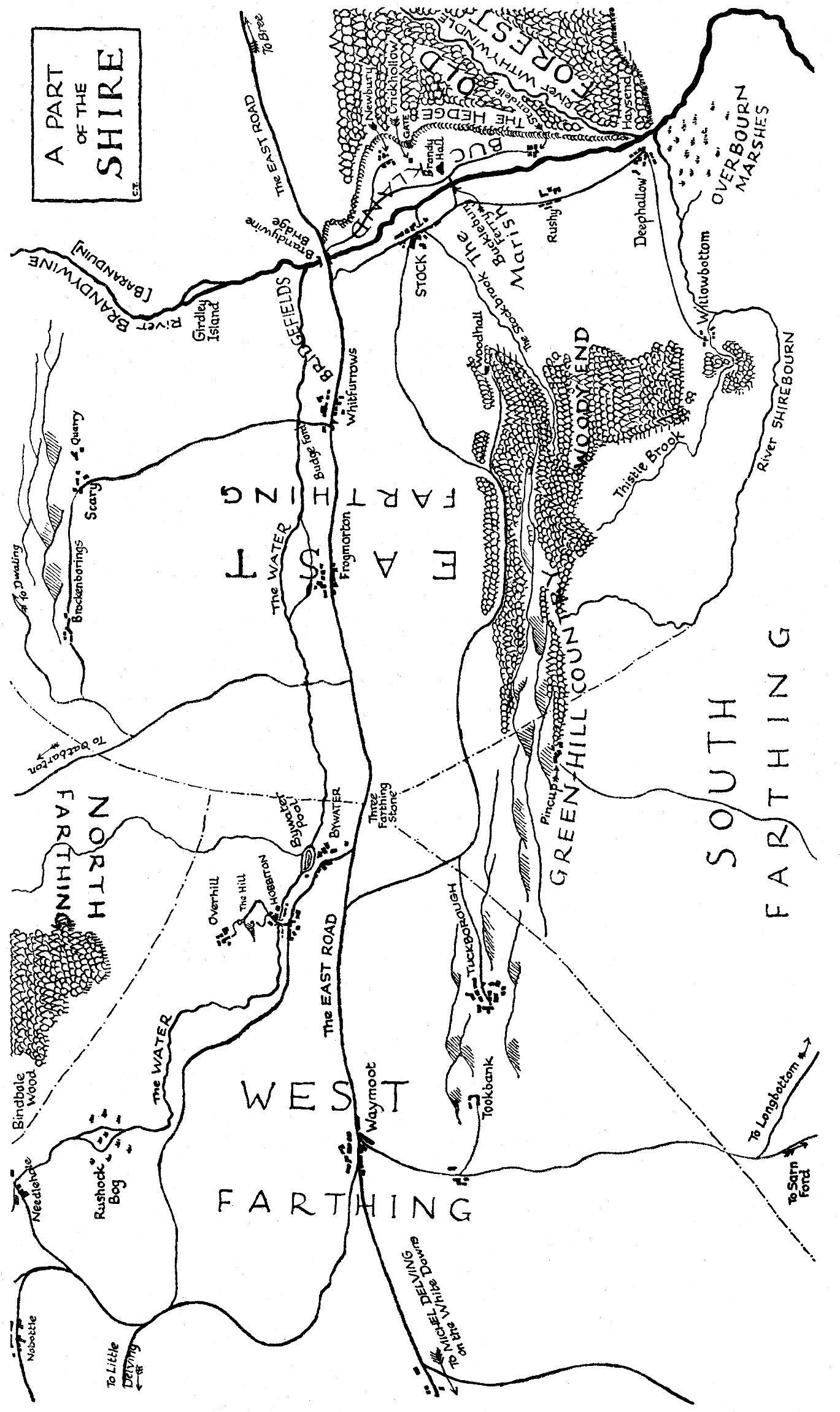
BOOK ONE
Конец ознакомительного фрагмента.
Текст предоставлен ООО «ЛитРес».
Прочитайте эту книгу целиком, купив полную легальную версию на ЛитРес.
Безопасно оплатить книгу можно банковской картой Visa, MasterCard, Maestro, со счета мобильного телефона, с платежного терминала, в салоне МТС или Связной, через PayPal, WebMoney, Яндекс.Деньги, QIWI Кошелек, бонусными картами или другим удобным Вам способом.


